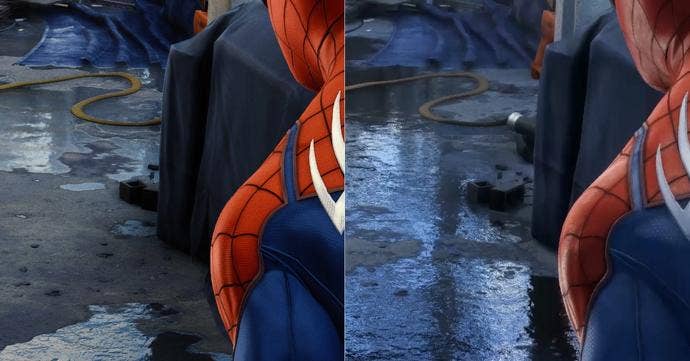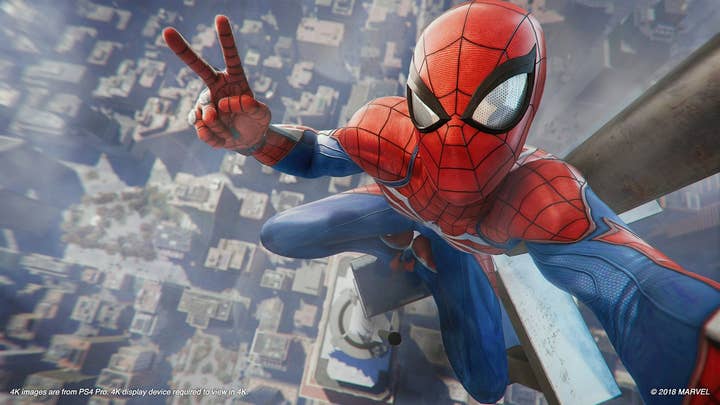Lessons from Spider-Man
Creative director Bryan Intihar reflects on the highs and lows of making the PS4 hit, dealing with negativity, and adapting an icon
Insomniac's Bryan Intihar can finally take a breath. The creative director of Marvel's Spider-Man on PlayStation 4 has seen the game launch to tremendous reviews, watched it break sales records, and finished work on the game's season pass downloadable content. When he sits down to speak with GamesIndustry at the DICE Summit in Las Vegas earlier this month, he seems able to begin processing some takeaways from the experience.
"For me it was an absolute career highlight, being able to be the creative director on a property that's so well known and well loved by so many fans," Intihar says. "And also for me, something that's been in my life since I was five years old, wearing Spider-Man Underoos. I feel like we did it. People had an expectation when they heard Insomniac was making a Spider-Man game, and I feel like we delivered it. We had this idea of telling a very human story in a super-hero world and we delivered it. From a gameplay perspective, making you feel like Spider-Man more than before.
"And really in many ways, I grew as a person throughout the process. It was a very emotional experience working on this game, just the highs and lows of game development, understanding that, coming to grips with those moments, and becoming a better Insomniac in the process of learning to lean on others, being transparent with feedback, and when times are tough to rely on the team because teams are great."
When asked about the highs, Intihar has no trouble rattling off his favorite moments during the game's development. He talks about the first hands-on demo for the press, for a Game Informer cover story. The team had been working hard to improve the game's combat in the month leading up to the demo, and Intihar recalls nervously watching the journalists put the game through its paces, gradually improving as they came to grips with the various combat systems. He fondly remembers some of the key developers watching the playthrough, exchanging knowing smirks when they realized the work had produced the hoped for results.
"You have to be careful anytime anything comes out, because people are so scared it's not going to live up to [expectations]"
His other favorite memory is E3 2017, when Sony Worldwide Studios president Shuhei Yoshida played the game for the first time, having previously only seen footage of the demo, which intercut traditional combat sequences with cinematic quicktime events in a way that had some onlookers concerned about the game being smoke and mirrors. Intihar says he got distracted talking with someone else for a moment, only to have his attention reclaimed by a very enthused Yoshida.
"He turns around and goes, 'It's real! It's real!' and he gave this big smile on his face," Intihar recalls. "When Shu smiles, it's one of the greatest things ever. We just knew it was going to be OK. You can't help but smile when Shu smiles."
Having recapped some of the highs in detail, Intihar is less specific about the lows.
"It was just the normal stuff," he says. "This isn't clicking in the game. Some people didn't like the story at certain points. People freaking out about puddles three weeks before the game ships. Those are just normal bumps in the road."
While it's certainly not normal for people to freak out specifically about puddles three weeks before the game ships, it's not unusual in the lead up to a major release for excited fans to overreact to issues non-fans would consider trivial, at best. Upon Spider-Man's release, the puddle issue was quickly drowned out by glowing reviews and word-of-mouth. Despite emerging from the controversy relatively unscathed, Intihar sees few takeaways for developers.
"When you work on something as high profile with such a well-known character," he says, "there's always the question of, 'Is it really going to live up to the hype? Is it going to live up to expectations?' And there's that fear that oh my god, maybe it's not going to be as good. So I think it's more that you have to be careful anytime anything comes out, because people are so scared it's not going to live up to [expectations]."
Intihar says he and other Insomniacs painstakingly went through every screenshot or video the studio released, picking it apart from every angle looking for bugs or things that would put the game in an unflattering light. He was driven to do that in part because he knows that's the level of scrutiny the audience will bring to bear on whatever the studio puts out.

"If we release a minute of footage, you're going to have our hardest core fans dissecting literally every single [frame]," he says. "Which is great because they're so stoked and talking about it, getting the word out and building buzz. But they're also looking for [problems]. And I get it, I would maybe be the same way... When anything--a video game, a movie, a TV show--is that anticipated, they just want to see more of it. They want to talk about it. They want to tell their friends about it. They want to post about it. Those things are just going to happen."
At the same time, that's feedback, and Intihar is very clear that Insomniac pays attention to all of its fan feedback. Sometimes it's not exactly on the mark, but other times it makes for a genuinely better game. He notes that after one of the game's E3 appearances, some people complained that the web-swinging felt a bit slow, which prompted the team to dig in and work on it some more. By the game's next public showing, the swinging had been improved.
"There's the negative side of people focusing on things they want to see, problems or issues," Intihar says. "At the same time, sometimes they bring light to things we can improve, and that was a good example... I worry sometimes when things start to pick up and that becomes the story, rather than the cool new thing, when the criticism dominates the story."
"Once you understand what makes that character tick, that's when you mix things up, because the core will stay the same"
Intihar would rather focus on the positive, like the player who was inspired to volunteer at a homeless shelter after seeing Peter Parker doing the same thing in the game. Or how the team included an in-game nod to the Spidey Squad, a group of superfans who had avidly followed and supported the game since its unveiling.
Certainly, most of the story surrounding Marvel's Spider-Man has been positive, a critically acclaimed AAA blockbuster in a subgenre--licensed comic book adaptations--with what could generously be called an inconsistent history of quality. So having pulled off that rare feat, what advice does Intihar have for other creators adapting an iconic property to video games?
"Drill really deep into the DNA of the character," Intihar answers. "That's what we did. If you stay true to the DNA of the character, you're never going to go wrong. Whether it's Spider-Man, Iron Man, The Avengers, whatever it is, those characters have been around for so long. There are so many stories that have been told. And if you drill down to all those different stories, the core of those characters is the same. And if you can deliver on that core, then you can take those chances. Once you understand what makes that character tick, that's when you find the freedom to mix things up, because the core will stay the same."
Intihar says that's why Insomniac felt comfortable making Peter Parker a little bit older, shifting his day job from photographer to scientist, having him work for Otto Octavius, and making Mary Jane a reporter. Those were details that could be shifted because the core was true to the source material, specifically "Peter and Spider-Man's worlds colliding and this idea of two characters in one."
"Whenever Peter succeeds, Spider-Man fails, and vice versa," Intihar says. "Those lives are always intertwined, but there's a give and take. That's sometimes a lot of what life is. Sometimes when you're pushing yourself really hard in your career, other parts of your life suffer. Peter's always striving for balance. We're all striving for balance in our lives, and I think that's a really relatable topic which was fun to explore in this game."


